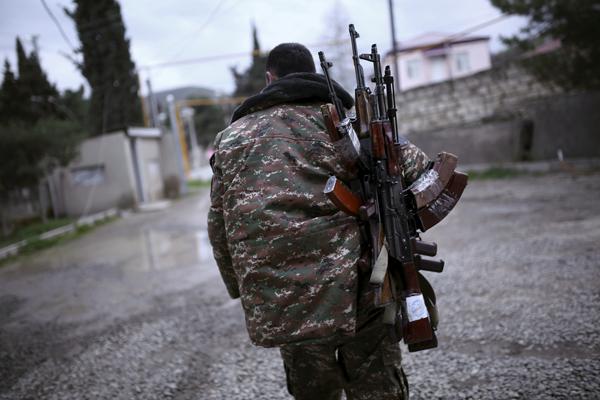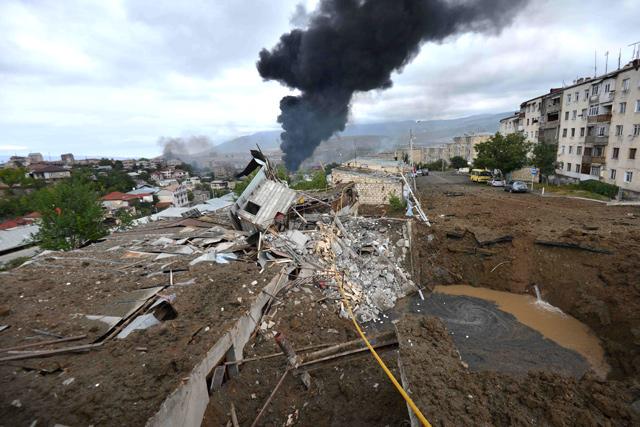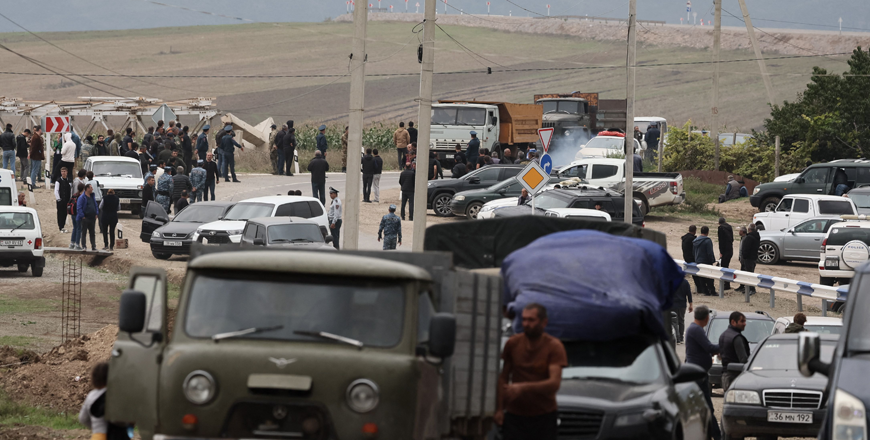You are here
Warring sides declare ceasefire over Nagorno-Karabakh
By Reuters - Apr 05,2016 - Last updated at Apr 05,2016

A soldier of the self-defence army of Nagorno-Karabakh carries weapons in Martakert province, which according to Armenian media was affected by clashes over the breakaway Nagorno-Karabakh region, on Monday (Reuters photo)
BAKU/YEREVAN — Azerbaijan and its breakaway region of Nagorno-Karabakh said they had halted hostilities on Tuesday after four days of intense fighting that had prompted fears of all-out war.
Reuters was not able independently to verify whether the fighting — a resurgence of a decades-old conflict over the status of the region — had, in fact, stopped.
But an official in the breakaway region's Armenian-backed administration said the ceasefire was being observed. "Along the entire line of the front there is a relative lull," the official, Davit Babayan, told Reuters.
Several European countries had urged an end to the fighting, worried that an escalation could cause instability in a region that serves as a corridor for pipelines taking oil and gas to world markets.
The fighting has been the bloodiest in years, with Azerbaijan saying 16 of its servicemen had been killed in the previous 48 hours. Officials in the breakaway region said 20 of their soldiers had been killed since the fighting started.
The ex-Soviet states of Azerbaijan and Armenia fought a war over the mountainous territory in the early 1990s in which thousands were killed on both sides and hundreds of thousands displaced.
The war ended with a truce in 1994, although there have been sporadic flare-ups since. The ceasefire was shattered over the weekend, with the two sides exchanging heavy fire using artillery, tanks, rocket systems and helicopters.
Azerbaijan's defence ministry issued a statement saying: "On April 5 at 12:00pm (0800 GMT), on the basis of a mutual agreement, military actions on the contact line between the armed forces of Armenia and Azerbaijan are halted."
An official with the Armenian-backed armed forces of Nagorno-Karabakh told Reuters: "We've been ordered to halt fire."
As late as Tuesday morning, before the ceasefire was announced, both sides had been reporting fresh clashes.
Risk of escalation
An all-out war over Nagorno-Karabakh could drag in the big regional powers, Russia and Turkey. Moscow has a defence alliance with Armenia, while Ankara backs its ethnic Turkic kin in Azerbaijan.
Turkish Prime Minister Ahmet Davutoglu on Tuesday condemned what he said were Armenian attacks, and said Turkey would stand by Azerbaijan. Earlier, Russia's foreign minister had said Ankara's support for Baku was one-sided.
Nagorno-Karabakh is an enclave with a large ethnic Armenian population that lies inside the territory of Azerbaijan. The violence was a re-awakening of a long-festering ethnic conflict between the mainly Muslim Azeris and their Christian Armenian neighbours.
Envoys from Russia, France and the United States — who make up a body called the Minsk Group that mediates in the conflict — were planning to head to the region, French Foreign Minister Jean-Marc Ayrault said in Paris.
"We can see that military conflict cannot be the solution," Ayrault told reporters after talks with his German counterpart Frank-Walter Steinmeier.
Even if the ceasefire holds in the short-term, there is still potential for the fighting to flare again.
Anger and frustration are building in Azerbaijan that years of talks have failed to bring Nagorno-Karabakh under its control. The country has used revenues from exports of crude oil to build up its military, leading some Azeris to believe that if there was another war, they could win it.
Azerbaijan said its troops had seized small pockets of territory in the latest fighting, and were fortifying those locations to make sure that it held on to its gains.
Related Articles
TALYSH, Azerbaijan — Elmira Bagiryan, a resident of a village at the epicentre of four days of fighting between Azerbaijan and ethnic Armeni
STEPANAKERT, Azerbaijan — Armenian and Azerbaijani forces exchanged rocket fire as fighting intensified over Nagorno-Karabakh on Sunday, wit
GORIS, Armenia — Thousands of refugees from Nagorno-Karabakh streamed into Armenia on Monday, as the presidents of Azerbaijan and ally Turke



















